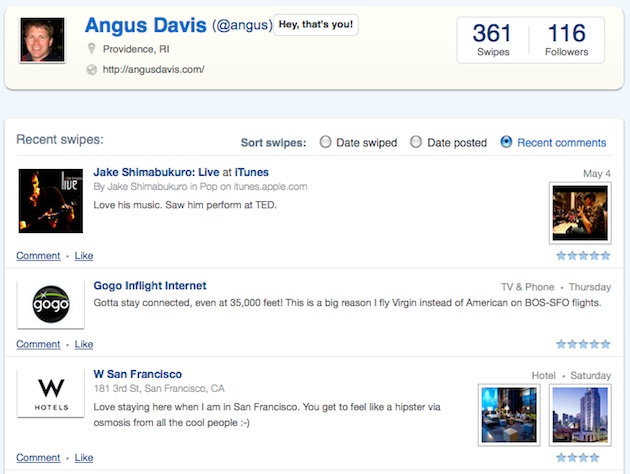Want smarter insights in your inbox? Sign up for our weekly newsletters to get only what matters to enterprise AI, data, and security leaders. Subscribe Now
 It looks like Blippy isn’t the only startup betting that users want to tell their friends what they’ve been buying — it’s joined today by Swipely, a site that’s launching its invitation-only preview.
It looks like Blippy isn’t the only startup betting that users want to tell their friends what they’ve been buying — it’s joined today by Swipely, a site that’s launching its invitation-only preview.
But Providence, Rhode Island-based Swipely is more than just a Blippy clone. There’s one big difference worth noting right away — where Blippy’s big feature is sharing how much money you spent at a certain store or website, Swipely never shares the amount.
That should help overcome some of the obvious privacy concerns; there are probably people who don’t want everyone to know how much they’re spending, but who are comfortable saying that they bought a cup of coffee from Starbucks or a book from Amazon. “The focus is really on what the person thinks about that experience,” said founder and chief executive Angus Davis. “It’s not about broadcasting your credit statements, and it’s not about showing the amount you spent.”
Davis talked about Swipely’s features last week, and it really seemed like a well-thought-out product. Again, that’s in contrast to Blippy, whose founders seemed to take a more “we’ve got a cool idea, we’ll refine the details as we go along” approach — an approach that’s consistent with a lot of startup advice that you hear in Silicon Valley, and which seems to be have paid off initially for Blippy, with rapidly increasingly month-to-month traffic. On the other hand, it can lead to big embarrassments, as when the credit card numbers of a few Blippy users were found on Google.
Purchases can be shared on Swipely either from users’ credit card accounts or from email receipts — you can even set it to automatically download email receipts from specific stores directly from your account. Once a purchase is in the Swipely system, the site tries to translate the codes and abbreviations that you often find on your credit card bill into a real store name and location. The company has deals to carry the product catalogs of retail stores, adding up to a total of 250,000 locations, so that you aren’t just sharing where you made a purchase, but the specific item you bought. Users are encouraged to include a mini-review of what they thought about the product too.
And on the security front, Swipely uses bank-grade encryption and has been certified by third-party security servies like TRUSTe, VeriSign, and McAfee.
Now, all of that probably won’t overcome anyone’s misgivings about the initial idea. But it’s clear that investors think there’s a real opportunity in this market. Swipely has raised $8.5 million total, including a $7.5 million institutional round, from investors including Index Ventures, First Round Capital, Greylock Partners, plus well-known angel investors Chris Sacca of Lowercase Capital, Keith Rabois of Slide, former Mint.com vice president Anton Commissaris, and prolific angel investor Ron Conway. Through the Greylock investment, Swipely gets a big-name board member in the form of LinkedIn cofounder Reid Hoffman.
Blippy, meanwhile, has its own roster of impressive backers, including Sequoia Capital, Charles River Ventures, August Capital, Mahalo founder Jason Calacanis, Hot or Not founder James Hong, Twitter cofounder Ev Williams, and, once again, Ron Conway.


